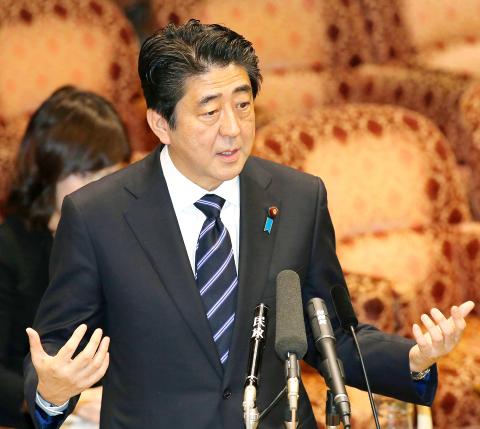Japanese Prime Minister Shinzo Abe yesterday said that his government would not revise a landmark 1993 “comfort women” apology and said he was “deeply pained” by the suffering of women drawn into a system of wartime brothels.
Abe, who has made similar remarks in the past, has faced criticism for his government’s alleged plan to review what is known as the Kono Statement, which acknowledged official complicity in the coercion of military sex slaves, a historical legacy that draws raw resentment in neighboring South Korea.
Respected historians say up to 200,000 women, mostly from Korea, but also from Taiwan, China, Indonesia and the Philippines, were forced to serve Japanese soldiers. They are sometimes called “comfort women.”

Photo: AFP
Abe said yesterday that his Cabinet “upholds the position on the recognition of history outlined by the previous administrations in its entirety,” including the Kono Statement.
“With regard to the comfort women issue, I am deeply pained to think of the comfort women who experienced immeasurable pain and suffering, a feeling I share equally with my predecessors,” he told a parliamentary committee, according to a statement issued by the Japanese Ministry of Foreign Affairs.
“The Kono Statement addresses this issue... As my Chief Cabinet Secretary [Yoshihide] Suga stated in press conferences, the Abe Cabinet has no intention to review it,” he said.
Suga, the government’s top spokesman, said on Monday that there was no plan to revise the statement, adding that Tokyo’s review was aimed at verifying historical facts and to determine if South Korea was involved in drafting its text.
Neither Suga’s comments, nor the latest remarks from Abe, clarified what would happen if Tokyo’s review was at odds with the official apology.
In 1993, after hearing testimony from 16 South Korean women, Japan offered “sincere apologies and remorse” to the women, and vowed to face the historical facts squarely.
However, repeated wavering on the issue among senior right-wing politicians has contributed to a feeling in South Korea that Japan is in denial and is not sufficiently remorseful.
Some Japanese conservatives have responded that Tokyo has repeatedly apologized and that the issue was being used for political gain.
“As I have stated earlier, we must be humble in front of history,” Abe also said yesterday.
However, he added that “history should not be politicized or be turned into a diplomatic issue. Research on history should be entrusted to experts and historians.”

NATIONAL SECURITY THREAT: An official said that Guan Guan’s comments had gone beyond the threshold of free speech, as she advocated for the destruction of the ROC China-born media influencer Guan Guan’s (關關) residency permit has been revoked for repeatedly posting pro-China content that threatens national security, the National Immigration Agency said yesterday. Guan Guan has said many controversial things in her videos posted to Douyin (抖音), including “the red flag will soon be painted all over Taiwan” and “Taiwan is an inseparable part of China,” while expressing hope for expedited “reunification.” The agency received multiple reports alleging that Guan Guan had advocated for armed reunification last year. After investigating, the agency last month issued a notice requiring her to appear and account for her actions. Guan Guan appeared as required,

A strong cold air mass is expected to arrive tonight, bringing a change in weather and a drop in temperature, the Central Weather Administration (CWA) said. The coldest time would be early on Thursday morning, with temperatures in some areas dipping as low as 8°C, it said. Daytime highs yesterday were 22°C to 24°C in northern and eastern Taiwan, and about 25°C to 28°C in the central and southern regions, it said. However, nighttime lows would dip to about 15°C to 16°C in central and northern Taiwan as well as the northeast, and 17°C to 19°C elsewhere, it said. Tropical Storm Nokaen, currently

‘NATO-PLUS’: ‘Our strategic partners in the Indo-Pacific are facing increasing aggression by the Chinese Communist Party,’ US Representative Rob Wittman said The US House of Representatives on Monday released its version of the Consolidated Appropriations Act, which includes US$1.15 billion to support security cooperation with Taiwan. The omnibus act, covering US$1.2 trillion of spending, allocates US$1 billion for the Taiwan Security Cooperation Initiative, as well as US$150 million for the replacement of defense articles and reimbursement of defense services provided to Taiwan. The fund allocations were based on the US National Defense Authorization Act for fiscal 2026 that was passed by the US Congress last month and authorized up to US$1 billion to the US Defense Security Cooperation Agency in support of the

A Vietnamese migrant worker yesterday won NT$12 million (US$379,627) on a Lunar New Year scratch card in Kaohsiung as part of Taiwan Lottery Co’s (台灣彩券) “NT$12 Million Grand Fortune” (1200萬大吉利) game. The man was the first top-prize winner of the new game launched on Jan. 6 to mark the Lunar New Year. Three Vietnamese migrant workers visited a Taiwan Lottery shop on Xinyue Street in Kaohsiung’s Gangshan District (崗山), a store representative said. The player bought multiple tickets and, after winning nothing, held the final lottery ticket in one hand and rubbed the store’s statue of the Maitreya Buddha’s belly with the other,